unit12Review(6)
- 格式:doc
- 大小:28.00 KB
- 文档页数:2
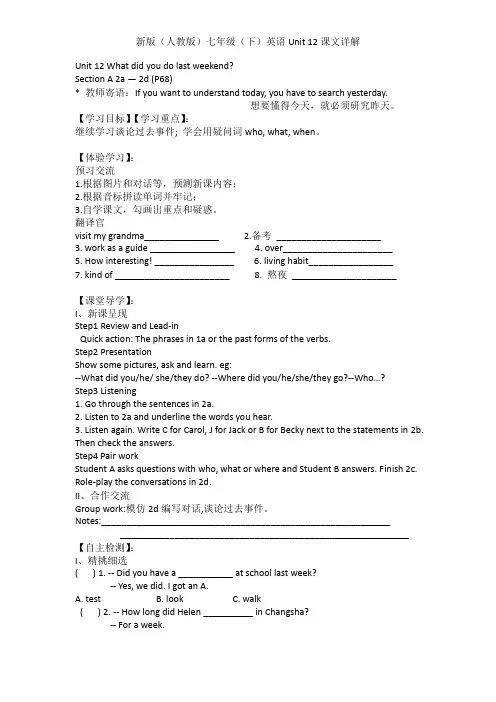
Unit 12 What did you do last weekend?Section A 2a — 2d (P68)* 教师寄语:If you want to understand today, you have to search yesterday.想要懂得今天,就必须研究昨天。
【学习目标】【学习重点】:继续学习谈论过去事件; 学会用疑问词who, what, when。
【体验学习】:预习交流1.根据图片和对话等,预测新课内容;2.根据音标拼读单词并牢记;3.自学课文,勾画出重点和疑惑。
翻译官visit my grandma_______________ 2.备考_____________________3. work as a guide _________________4. over______________________5. How interesting! ________________6. living habit_________________7. kind of _______________________ 8. 熬夜_____________________【课堂导学】:I、新课呈现Step1 Review and Lead-inQuick action: The phrases in 1a or the past forms of the verbs.Step2 PresentationShow some pictures, ask and learn. eg:--What did you/he/ she/they do? --Where did you/he/she/they go?--Who…?Step3 Listening1. Go through the sentences in 2a.2. Listen to 2a and underline the words you hear.3. Listen again. Write C for Carol, J for Jack or B for Becky next to the statements in 2b. Then check the answers.Step4 Pair workStudent A asks questions with who, what or where and Student B answers. Finish 2c. Role-play the conversations in 2d.II、合作交流Group work:模仿2d编写对话,谈论过去事件。
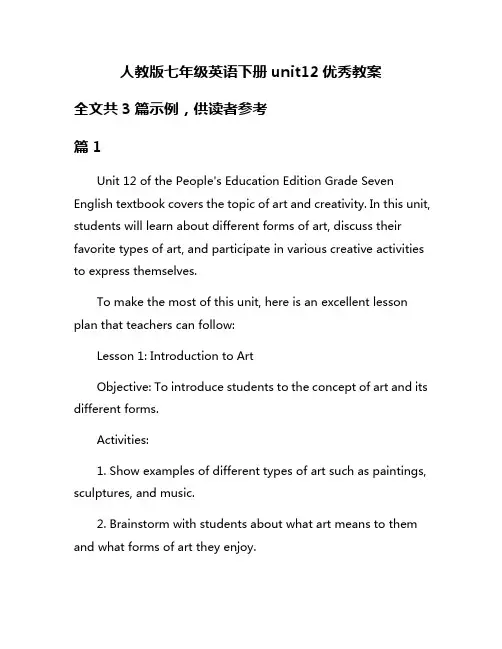
人教版七年级英语下册unit12优秀教案全文共3篇示例,供读者参考篇1Unit 12 of the People's Education Edition Grade Seven English textbook covers the topic of art and creativity. In this unit, students will learn about different forms of art, discuss their favorite types of art, and participate in various creative activities to express themselves.To make the most of this unit, here is an excellent lesson plan that teachers can follow:Lesson 1: Introduction to ArtObjective: To introduce students to the concept of art and its different forms.Activities:1. Show examples of different types of art such as paintings, sculptures, and music.2. Brainstorm with students about what art means to them and what forms of art they enjoy.3. Discuss the importance of art in society and how it can bea form of self-expression.Lesson 2: Famous ArtistsObjective: To learn about famous artists and their works.Activities:1. Introduce students to well-known artists such as Leonardo da Vinci, Vincent van Gogh, and Pablo Picasso.2. Show pictures of their famous works and discuss the style and themes of their art.3. Have students choose a favorite artist and create a poster about their life and works.Lesson 3: Creating ArtObjective: To engage students in creative activities to express themselves.Activities:1. Provide art supplies such as paints, crayons, and paper for students to use.2. Encourage students to create their own artwork inspired by the styles of famous artists or their own imagination.3. Have a mini art exhibition in the classroom to showcase students' works.Lesson 4: Reflecting on ArtObjective: To reflect on the role of art in our lives and society.Activities:1. Have a class discussion about how art can inspire, entertain, and provoke emotions.2. Ask students to write a reflection on what art means to them and how they can incorporate more art into their lives.3. Watch a short video about the impact of art on society and discuss its importance.By following this lesson plan, teachers can effectively cover the content of Unit 12 and engage students in meaningful discussions and activities related to art and creativity. This will not only help students improve their English skills but also develop their appreciation for art and the creative process.篇2Unit 12 of the People's Education Press seventh grade English textbook is focused on the theme of "Life in the future".In this unit, students will learn how to talk about their future plans, aspirations, and predictions. Here is an excellent lesson plan for teaching Unit 12 of the textbook:Lesson Plan:Title: Life in the futureGrade: 7Unit: 12 (People's Education Press)Theme: Future plans, aspirations, and predictionsDuration: 2 lessons (90 minutes each)Objectives:- Students will be able to talk about their future plans using the simple future tense.- Students will be able to express their aspirations for the future.- Students will be able to make predictions about the future using future tense modal verbs.- Students will be able to write a short paragraph describing their future plans.Warm-up (15 minutes):- Begin the lesson by asking students to brainstorm and discuss what they think life will be like in the future. Encourage them to think about technology, education, careers, and daily life.- Play a short video or show pictures of futuristic inventions and ask students to describe what they see.Presentation (30 minutes):- Introduce the simple future tense to students and explain its formation (will + base verb).- Give examples of how to talk about future plans using the simple future tense.- Practice with students by asking them to talk about their own future plans using the simple future tense.- Introduce future tense modal verbs (will, might, may) for making predictions about the future.- Give examples of how to make predictions using future tense modal verbs.Practice (30 minutes):- Divide students into pairs and ask them to discuss and write down their future plans using the simple future tense.- Monitor and provide assistance as needed.- Ask some pairs to share their plans with the class.Production (15 minutes):- Ask students to write a short paragraph (5-7 sentences) describing their future plans using the simple future tense.- Provide a writing prompt to help guide students in their writing.- Allow students to share their paragraphs with the class.Review and Assessment (15 minutes):- Review key concepts and vocabulary from the lesson.- Ask students to complete a short quiz or worksheet to assess their understanding of the simple future tense and future tense modal verbs.- Provide feedback and address any misconceptions.Homework:- Assign students to write a diary entry about a day in their future life using the simple future tense.By following this lesson plan, students will be able to effectively communicate their future plans, aspirations, andpredictions in English. This lesson plan incorporates various activities to engage students and reinforce key language concepts related to the theme of "Life in the future" in Unit 12 of the People's Education Press seventh grade English textbook.篇3Unit 12: You’re supposed to shake handsTeaching Objectives:1. Students will be able to understand the cultural differences in greetings between different countries.2. Students will be able to use the target language for greetings appropriately.3. Students will be able to reflect on the importance of cultural understanding and respect.Teaching Procedures:Step 1: Warm-up (10 minutes)- Begin the class by showing a video clip of people from different cultures greeting each other. Ask the students to share their thoughts on the various greetings they saw.- Discuss the importance of greetings in different cultures and how they can vary from country to country.Step 2: Presentation (15 minutes)- Introduce the target language for greetings and practice pronunciation with the students.- Show a slideshow or video presentation of common greetings in different countries, emphasizing the cultural significance of each greeting.- Have students take notes on the different greetings and their cultural meanings.Step 3: Practice (20 minutes)- Divide the class into pairs or small groups and have them practice the target language greetings with each other.- Encourage students to think about the appropriate greetings for different situations (formal vs. informal, meeting strangers vs. meeting friends).- Monitor and provide feedback as needed.Step 4: Cultural Understanding (15 minutes)- Engage the students in a discussion about the importance of cultural understanding and respect when greeting others.- Ask students to reflect on a time when they may have misunderstood a greeting in a different culture and how they could have handled the situation better.- Encourage students to think about ways they can show respect for other cultures in their daily lives.Step 5: Review and Assessment (10 minutes)- Review the target language greetings with the whole class and assess student understanding through a quick quiz or game.- Encourage students to continue practicing their greetings outside of the classroom and to explore more about different cultures and their greetings.Homework:- Ask students to research a different culture and its traditional greetings, and to write a short reflection on what they learned.By following this detailed lesson plan, students will not only learn the target language for greetings but also gain a deeperunderstanding of the importance of cultural awareness and respect.。
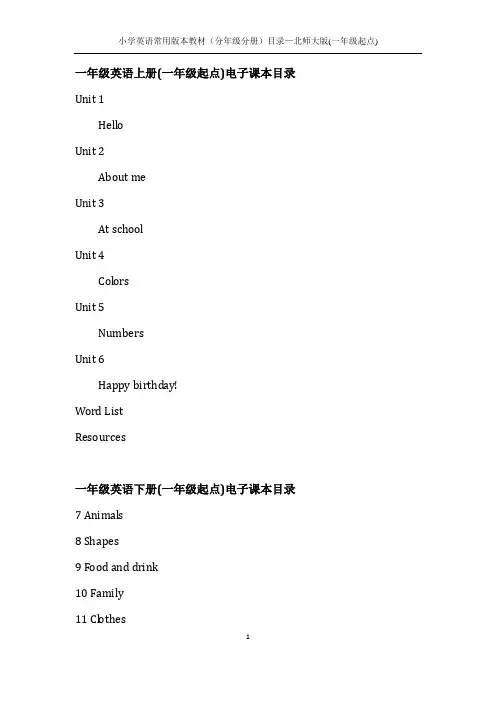
一年级英语上册(一年级起点)电子课本目录Unit 1HelloUnit 2About meUnit 3At schoolUnit 4ColorsUnit 5NumbersUnit 6Happy birthday!Word ListResources一年级英语下册(一年级起点)电子课本目录7 Animals8 Shapes9 Food and drink10 Family11 Cl othes12 I can swimWord ListResources二年级英语上册(一年级起点)电子课本目录Unit 1 Hello!Unit 2 Mocky’s friendsUnit 3 My friendsUnit 4 My familyUnit 5 WelcomeUnit 6 ReviewUncle Booky’s ABCVocabularyWord ListMasks二年级英语下册(一年级起点)电子课本目录Unit 7 FruitUnit 8 VegetablesUnit 9 NumbersUnit 10 ColorsUnit 11 I canUnit 12 ReviewUncle Booky’s ABCVocabularyWord List三年级英语上册(一年级起点)电子课本目录Unit 1 Don’t walk!Unit 2 How much?Unit 3 Uncle Booky’s studyUnit 4 Bobby’s houseUnit 5 Our schoolUnit 6 ReviewUncle Booky’s ABCVocabularyWord ListAppendix三年级英语下册(一年级起点)电子课本目录Unit 7 At the restaurantUnit 8 Big birdUnit 9 Hot soupUnit 10 Mockey’s storeUnit 11 I’m not wellUnit 12 ReviewUncle Booky’s ABCVocabularyWord List四年级英语上册(一年级起点)电子课本目录Unit 1Mocky the juggl erUnit 2I like BobbyUnit 3It’s too expensive!Unit 4Where is it?Unit 5Our townUnit 6ReviewVocabularyWord ListPositions Master四年级英语下册(一年级起点)电子课本目录Unit 7Today is MondayUnit 8Mocky is lateUnit 9Day and nightUnit 10Let’s go!Unit 11Uncle Jack’s farmUnit 12ReviewVocabularyWord List“Going to" Master五年级英语上册(一年级起点)电子课本目录Unit 1Ann’s dreamUnit 2Mocky’s bad dayUnit 3School sports dayUnit 4Mocky’s birthdayUnit 5I’m tallerUnit 6ReviewVocabularyVerb FormsSpecial Sounds五年级英语下册(一年级起点)电子课本目录Unit 7At the airportUnit 8The concertUnit 9A football gameUnit 10Buying e-booksUnit 11Cooking with MockyUnit 12ReviewWord ListSpecial Sounds六年级英语上册(一年级起点)电子课本目录Unit 1Meeting the BINGO KidsUnit 2Charlie’s ch oresUnit 3Redrock Bay Health ClubUnit 4Choosing a giftUnit 5The broken computerUnit 6ReviewVocabularyWord List六年级英语下册(一年级起点)电子课本目录Unit 7The mountion bike raceUnit 8In the emergency roomUnit 9Life in the year 2050Unit 10Review 1Unit 11Review 2Unit 12Review 3Test 1Test 2Vocabulary。
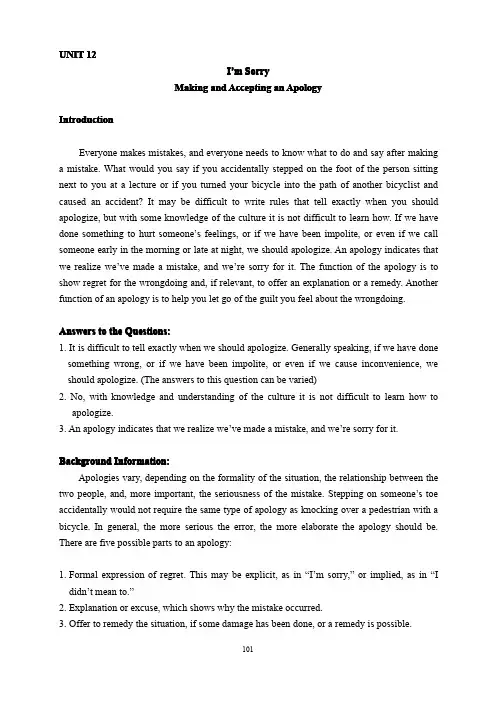
UNIT12I’m SorryMaking and Accepting an ApologyIntroductionEveryone makes mistakes,and everyone needs to know what to do and say after making a mistake.What would you say if you accidentally stepped on the foot of the person sitting next to you at a lecture or if you turned your bicycle into the path of another bicyclist and caused an accident?It may be difficult to write rules that tell exactly when you should apologize,but with some knowledge of the culture it is not difficult to learn how.If we have done something to hurt someone’s feelings,or if we have been impolite,or even if we call someone early in the morning or late at night,we should apologize.An apology indicates that we realize we’ve made a mistake,and we’re sorry for it.The function of the apology is to show regret for the wrongdoing and,if relevant,to offer an explanation or a remedy.Another function of an apology is to help you let go of the guilt you feel about the wrongdoing.Answers to the Questions:1.It is difficult to tell exactly when we should apologize.Generally speaking,if we have done something wrong,or if we have been impolite,or even if we cause inconvenience,we should apologize.(The answers to this question can be varied)2.No,with knowledge and understanding of the culture it is not difficult to learn how toapologize.3.An apology indicates that we realize we’ve made a mistake,and we’re sorry for it.Background Information:Apologies vary,depending on the formality of the situation,the relationship between the two people,and,more important,the seriousness of the mistake.Stepping on someone’s toe accidentally would not require the same type of apology as knocking over a pedestrian with a bicycle.In general,the more serious the error,the more elaborate the apology should be. There are five possible parts to an apology:1.Formal expression of regret.This may be explicit,as in“I’m sorry,”or implied,as in“I didn’t mean to.”2.Explanation or excuse,which shows why the mistake occurred.3.Offer to remedy the situation,if some damage has been done,or a remedy is possible.4.Assurance that the mistake will not be repeated.5.Admission of guilt,which shows that the person apologizing accepts the blame.The first part,the formal expression of regret,is almost always included in the apology. The other parts can be combined with the first part in various ways.Note,however,that the more serious the infraction,the more of these parts,except maybe explanation or excuse,will be included.Part One Listening InSandra and Paul are visiting their hometown during spring break.Sandra has just told a neighbor,Mrs.Wallace,about Paul’s new job after graduation.She also told her how much Paul was going to be earning...Paul:Aw,Sandra!What did you have to go and do that for?Sandra:Do what?Paul:You know what I’m talking about.Why did you tell Mrs.Wallace how much money I’m going to make?Now she’ll go and tell the whole world!Sandra:Well,I’m sorry.Paul:Yeah,but you know how she talks to everybody and their brother!Sandra:Well,I apologize.I guess I wasn’t thinking.I got all excited.I won’t let this sort of thing happen again.I wish I could make up for it.Paul:Oh well,it’s done now.I guess it doesn’t matter that much,anyway.They were bound to find out eventually.Everybody in this town ha has s got a very big nose!Sandra:You know,it is a lot of money for a first job...Paul:You think I’ll be able to buy a Porsche?Sandra:Well,I think you’d better wait and see how much is left after Uncle Sam gets his share.Notes:1.Make up for means compensate for a wrongdoing or mistake.2.Uncle Sam gets his share means the amount of income tax paid to the federal government.Answers to the Questions:1.He complains that Sandra told Mrs.Wallace how much money he’s going to make.2.Sandra says she’s sorry and apologizes.She explains that she got so excited that shewasn’t thinking when she told Mrs.Wallace how much Paul’s going to earn.3.She promises that she won’t let this sort of thing happen again.4.“Oh well,it’s done now.I guess it doesn’t matter that much,anyway.They were bound tofind out eventually.Everybody in this town’s got a very big nose!”By saying this,Paul shows acceptance of Sandra’s apology.5.People who have got big noses are interested in finding out things which do not concernthem.6.Uncle Sam refers to the U.S.(government or people),personified as a tall,spare man withchin whiskers,dressed in a red,white,and blue costume of swallow-tailed coat,striped trousers,and a tall hat with a band of stars.Part Two Better ListeningSection AConversation OneIn Ms.HillHill’’s OfficeMr.Sims:I apologize,Ms.Hill,but I’m running a little behind schedule.May I bring you the contract tomorrow instead of today?Ms.Hill:That’s fine.I won’t need it until late tomorrow afternoon anyway.But please make sure I have time to review it before my4o’clock meeting tomorrow.Answers to the Questions:1.Ms.Hill’s secretary or her subordinate.2.Because she did not finish doing her work according to schedule.3.Yes,she does.4.Sometime before4o’clock tomorrow.Discussion Questions:1.If Ms.Hill were angry at Mr.Sims,she might have replied differently.Give an example ofhow she might have responded if she hadn’t accepted the apology and the excuse.2.If Mr.Sims had wanted to reassure Ms.Hill that his tardiness was not going to be a habit,what could he have added to his apology?3.Everyone sometimes runs behind schedule.When do you?And what do you say in thosesituations?Does what you say to apologize differ depending on who you are speaking to (superior,inferior,family,friend)?Give examples.Conversation TwoJoan’’s and MikeMike’’s HomesIn the Driveway between JoanJoan:Oh,Mike!I’m so sorry about Yelsin tearing up your newspaper again.I’ll have Dan get you another when he comes home.Mike:Thanks,Joan,but I wish you’d keep a better eye on your dog.He’s always getting into my flower beds and digging up my roses.Joan:I really am sorry he’s caused so much trouble lately.I’ll have the fence repaired this week,so he can’t get out of the yard.I promise it won’t happen again.Mike:I hope not.Answers to the Questions:1.Yelsin is a dog.Dan is probably Joan’s husband.2.Joan is sorry about Yelsin tearing up Mike’s newspaper and about getting into his flower beds and digging up his roses.3.She offers to have Dan get Mike another newspaper when he comes home.Discussion Questions:1.What can we infer about the fence around Joan’s house?2.How is Mike probably feeling when she says,“I hope not”?Is he completely acceptingJoan’s apology?Why or why not?Conversation ThreeAt a C af aféé(After the waitress has just spilled coffee on a customer’s jacket:)Waitress:Excuse me,Sir!I’m sorry I’m so clumsy!I’ll get something to clean your jacket right away!Man:No great harm done.I just hope it doesn’t stain.Waitress:I’ll be glad to pay to have your jacket dry cleaned for you,Sir.I do apologize. Man:Thank you very much.I do appreciate it.Answers to the Questions:1.A waitress and a customer.2.The waitress probably spilled something(e.g.coffee)on the customer’s jacket.3.The waitress’s excuse is that he’s very clumsy.4.The waitress offers to pay to have the customer’s jacket dry cleaned.Discussion Questions:1.The waitress finds herself an excuse.Could she have used another(perhaps a better)excusefor the accident?2.Would this situation be handled differently by a waitress if this happened in a restaurant inChina?Explain.Section BConversation OneJanice:Excuse me for not waiting for you,honey,but I didn’t know how long you’d be,andI was starving!Henri:No problem.I had a late meeting and grabbed a bite on the way home.Discussion Questions:1.Where did this conversation probably take place?2.If Janice had been really angry at her husband,what might she have said?How might hehave responded?3.If you are going to be late for dinner—for anything,what do you do?4.When do you sometimes grab a bite?Where do you do this and what do you usually have?Conversation TwoBob:Excuse me for being late to class this morning,Dr.Smith.I just don’t know what to say.I must have turned the alarm clock off and gone back to sleep again.Dr.Smith:Well,it it’’s OK this time.But you know it’s disturbing for the rest of the class. Bob:Yes,I know.You’re right.I won’t let it happen again.Discussion Questions:1.Have you ever been late to class?What were your excuses?2.Did your professor accept your excuses?What did he or she say?Conversation Three(The telephone rings.)Russell:Hello?Sandy:Hi,Russ?It’s me.Look,I’m having a bit of trouble with the car.I’m very sorry that I wonwon’’t be able to make it tonight.Russell:Oh really?What is it?Sandy:Well,it’s the carburetor again.We just had it fixed last week,but it must be clogged up again somehow.Russell:I’m sorry to hear that.Well,I can see you in my office sometime later next week.How about Monday at9o’clock?Sandy:OK,fine.Sorry about the inconvenience.I’ll see you Monday at9.Don’’t worry about it.See you then.Russell:DonSandy:Thanks.Bye.Discussion Questions:1.Sandy says she won’t be able to make it tonight.What does IT probably refer to?2.When Russell says he is sorry,is this an apology?Part Three Speaking OutFunctional ExpressionsOffering apologies:I beg your pardon,sir.(I didn’t realize you were speaking to me.)Pardon me,please,for...(stepping on your foot.)I hope you’ll forgive...(my absence yesterday.I was ill.)Please accept my apology for...(not telling you the truth.)Excuse me for...(being late.I forgot about the time.)I(would like to)apologize for...(knocking over your cup.I didn’t see it.)I’m very(really/terribly/awfully)sorry...(that I woke you.)I’m sorry.I didn’t mean to...(hurt you.)Sorry about...(the steak.I’ll be glad to prepare you another one.)Oh no!Did I do that?I’m sorry.Oh!Sorry!Sorry about that.Oops.Accepting apologies:That’s quite all right.I understand completely.You really don’t have anything to apologize for.You don’t need to apologize.It’s not your fault.Oh,well,that’s life.Don’t worry about it.No harm done.That’s okay.It’s OK.No problem.Forget it.No big thing.No sweat.(very informal)Section ASuggested reasons,excuses or remedies:1.I’m afraid I overslept and missed the bus.I won’t let it happen again.2.I’ve been too busy with my computer.I promise I’ll get straight A’s next semester.3.I was in a bit of a bad mood.We lost the contract to build fifty planes.I should learn to bemore self-controlled.I’ll fix the supper today.You like Chinese food?(Snapping at someone means speaking in a fast,usually annoyed,way.We sometimes snap at people when we’re in a bad mood or when something bothers or annoys us.)4.The seafood transport company is on strike.We have no more supplies of fish.Part Four Comprehensive PracticeSection AThere are many different situations that require an apology,but they all have something in common:Something undesirable or uncomfortable has happened.Americans apologize for hurting someone’s feelings or causing a misunderstanding.They also apologize for being impolite,such as interrupting a conversation or meeting.If an American takes someone else’s property by mistake or damages another person’s property he is expected to give his apology too.Apologizing for causing inconvenience,for example,being late for a meeting;calling someone early in the morning;or dialing a wrong number on the phone,takes place all the time in an American’s daily life.Bumping someone accidentally while walking on the street you should say“Excuse me.”Apology is even required for telling a secret accidentally (“letting the cat out of the bag”).In addition,Americans also apologize when some person or animal for whom they have responsibility(for example,their children,guests,relatives,or pets)makes a social error.When someone has done something wrong and has apologized to you for the inconvenience or hurt,you can accept the apology by saying something like:“That’s OK”or “It couldn’t be helped.”In certain cases,a person will continue to be angry even though the other person has apologized,or may even refuse to accept the apology.This is extremely rude.A negative response is not the usual way to react to an apology and can make the situation worse and generally only escalates the conflict.Offering remedies or promising it won’t happen again is one way to deal with someone(usually an authority)who refuses to accept an apology.How people respond to an apology depends on the nature of the wrongdoing or discourtesy and the mood they are in when they receive the apology.Suggested answers to the guided note-taking exercises:1.Something undesirable or uncomfortable has happened2.1)someone’s feelings a misunderstanding2)impolite3)someone else’s property by mistake another person’s property4)being late for a meeting;calling someone early in the morning;dialing a wrong numberon the phone5)someone accidentally6)a secret accidentally7)for whom they have responsibility3.can make the situation worsethe nature of the wrongdoing and the mood they are inSection BQuestions::Answers to the Questions1.F2.T3.F4.TDiscussion Questions:1.Have you noticed any times when an apology would have been required in the Chineseculture but not in American culture or vice versa?2.How do you feel when someone should apologize to you but does not?3.Are there any situations in which Americans say“I’m sorry”or‘Excuse me”but are notreally apologizing?(You can use these two expressions if you walk between two people talking in the hallway, or if you cough,burp,belch,sneeze,hiccup,or yawn.You can also say“Pardon me”in amore formal situation.“I’m sorry”is also used to express sympathy.) 4.Have you ever refused to accept an apology?Under what circumstances?。
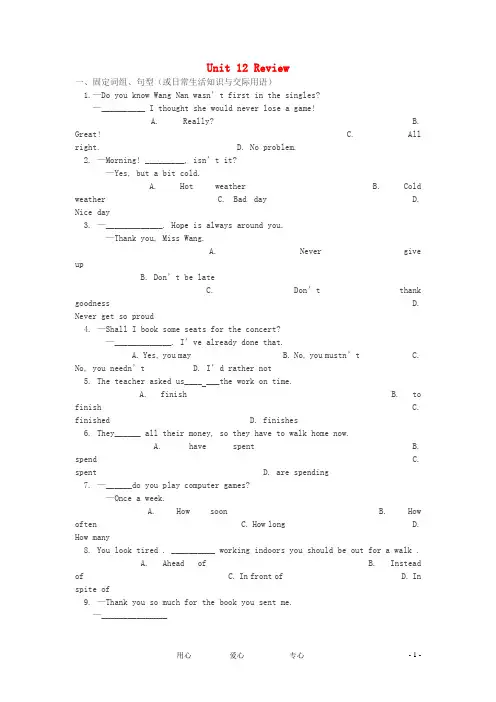
Unit 12 Review一、固定词组、句型(或日常生活知识与交际用语)1.—Do you know Wang Nan wasn’t first in the singles?—__________ I thought she would never lose a game!A. Really?B. Great!C. All right.D. No problem.2. —Morning! _________, isn’t it?—Yes, but a bit cold.A. Hot weatherB. Cold weatherC. Bad dayD. Nice day3. —_____________. Hope is always around you.—Thank you, Miss Wang.A. Never give upB. Don’t be lateC. Don’t thank goodnessD. Never get so proud4. —Shall I book some seats for the concert?—_____________. I’ve already done that.A. Yes, you mayB. No, you mustn’tC. No, you needn’tD. I’d rather not5. The teacher asked us____ ___the work on time.A. finishB. to finishC. finishedD. finishes6. They______ all their money, so they have to walk home now.A. have spentB. spendC. spentD. are spending7. —______do you play computer games?—Once a week.A. How soonB. How oftenC. How longD. How many8. You look tired . __________ working indoors you should be out for a walk .A. Ahead ofB. Instead ofC. In front ofD. In spite of9. —Thank you so much for the book you sent me.—_______________A. No,thanks.B. I’m glad you like it.C. Please don’t say so.D. No, it is not so.10. —If you want to go out of a cinema,which sign should you follow?—It’s________.A. EXITB. ENTRANCEC. NOPARKING D. NO SMOKING11. —There’s something wrong with my radio.—_____. I can mend it for you.A. It’s not good for youB. You’re rightC. Nevermind D. That’s right12. _______people we help, ________we feel.A. Many; the more happilyB. The more; the happierC. All; the happiestD. Most; the most happy13. The heavy snow stopped them the village.A. from leaveB. from leftC. from leavingD. leave14.—_____ do you like Chinese food?—Very much.A. WhatB. WhyC.How D. For what15. _____ in England are between 9 a. m. and 5 p. m. except Saturday and Sunday.A. NO PHOTOSB. MEALSC. NO SMOKINGD. OFFICE HOURS二、被动语态1. Many old houses around our school _ __ next year and a large green area will appear.A. pull downB. will be pulled downC. will pull downD. are pulled down2. People have realized how important the environment is,but still trees ______in the world every year.A. were cut downB. cut downC. are cutdown D. will be cut down3. On May 30th, 2005, one bowl in the Ming dynasty(明朝) _______ at the price of 30.36 million Hong Kong dollars.A. sellB. soldC. is soldD. was sold4. Today computers _______ in both cities and towns.A. were usingB. are usedC. wereused D. are using5. Dad, the phone is ringing. I guess either you or Mum on the phone.A. is wantedB. are wantedC.wants D. want6. The letter_________ in French. I can't read it.A. writesB. wroteC. is writingD. is written7. The flowers________ every day. Or they’ll die.A. must waterB. can be wateredC. shouldwater D. must be watered8. —Doctor, it seems _ you like to work with animals.—Yes, I think animals should as our friends.A. that; regardB. that; be regardedC. what; regardD. what; be regarded9. —How often ______ your school sports meeting ______?—Once a year.A. does; holdB. was; holdC. is;held D. did; hold10. —Did you go to Sam’s weekend party?—No, I___________.A. am not invitedB. wasn’t invitedC. haven’t invitedD. didn’t invite三、定语从句1. The money will be used to help the people ____ 1ost their homes in the Tsunami (海啸).A. whoB. whoseC.which D. where2. —Do you know everybody ______ came to the party?—Almost, but I don’t know the one ______ you talked with near the door. A. who, / B. whose, that C. that,which D. /, whom3. The young lady _____ we met yesterday is our new maths teacher.A. whatB. whoseC.whom D. which4. Most of the people _____ lost their lives in the attacks are Americans.A. whenB. whoC.how D. which5. I have tried my best .That is all I can do for you .A. whoB. whichC.that D. how【试题答案】一、固定词组、句型(或日常生活知识与交际用语)1~5 ADACB 6~10 ABBBA 11~15 CBCCD二、被动语态1~5 BCDBA 6~10 DDBCB三、定语从句1~5 AACBC【励志故事】改变人生的一句话卡耐基小时候是个大家公认的非常淘气的坏男孩。
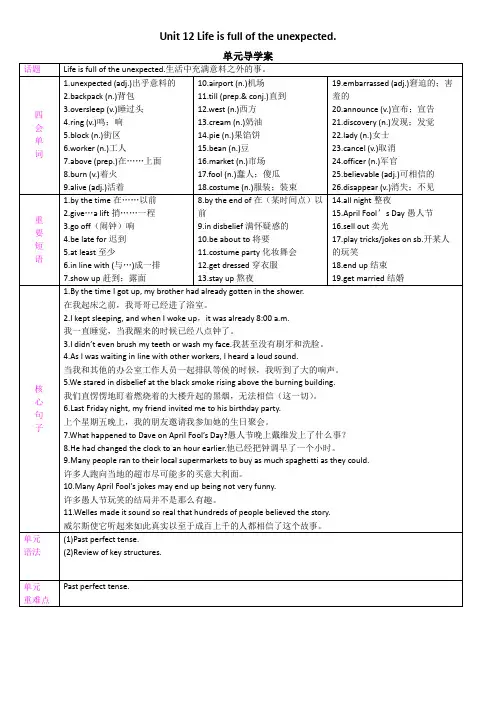
Unit 12 Life is full of the unexpected.第一课时Section A1 (1a~2d)自主预习案学生自学新单词(教材P89-90),比一比,看谁记得又快又准。
(见多媒体)1.出乎意料的 unexpected2.背包 backpack3.睡过头 oversleep4.鸣;响 ring 学生自查并写出本课短语(教材P89-90),读一读,记一记。
(见多媒体)1.在…以前 by the time2.捎……一程 give …a lift3.(闹钟)响 go off4.迟到 be late for5.至少 at least 随堂导学案 Step 1情景导入T:For one or more times in our school more, we are late for school.Have you ever been late for school? Can you tell me why? And what happened to you that day? Ss:①Yes, I have been late for school one or times.Because … ②I was nearly late for class one day and ….环节说明:通过课前询问学生是否有上学迟到的经历,这样一个师生问答互动引入新课的话题。
Step 2完成教材1a —1c 的任务1.学生迅速阅读1a 部分的内容。
并按要求完成课本上相应的任务:Look at the pictures what happened to the girl.2.检查答案,先要求全班一起给出答案并检查讨论。
然后要求2-3名学生就What do you usually do in the morning ?给出自己的答案,并把收集的答案列举在黑板上。
3.学生听第一遍录音,并完成课本上1b ,读出所填单词,读出完整的句子。
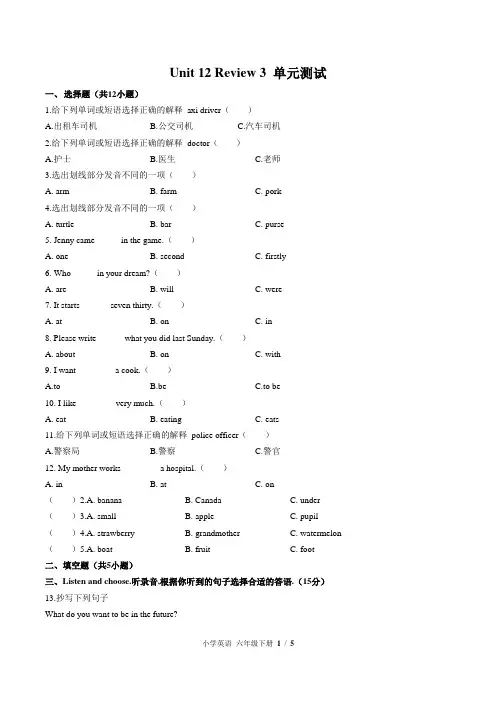
Unit 12 Review 3 单元测试一、选择题(共12小题)1.给下列单词或短语选择正确的解释axi driver()A.出租车司机B.公交司机C.汽车司机2.给下列单词或短语选择正确的解释doctor()A.护士B.医生C.老师3.选出划线部分发音不同的一项()A. armB. farmC. pork4.选出划线部分发音不同的一项()A. turtleB. barC. purse5. Jenny came _____ in the game.()A. oneB. secondC. firstly6. Who _____ in your dream?()A. areB. willC. were7. It starts ______ seven thirty.()A. atB. onC. in8. Please write______ what you did last Sunday.()A. aboutB. onC. with9. I want ________ a cook.()A.toB.beC.to be10. I like ________ very much.()A. eatB. eatingC. eats11.给下列单词或短语选择正确的解释police officer()A.警察局B.警察C.警官12. My mother works ________ a hospital.()A. inB. atC. on()2.A. banana B. Canada C. under()3.A. small B. apple C. pupil()4.A. strawberry B. grandmother C. watermelon ()5.A. boat B. fruit C. foot二、填空题(共5小题)三、Listen and choose.听录音,根据你听到的句子选择合适的答语.(15分)13.抄写下列句子What do you want to be in the future?____________________________________________________14.在每个单词后面写下不同食物的名称.grape cake pickle grapefruit apple olives potato chips french fries salad banana pizza lemon(1) crispy_____________(2) salty_____________(3) sour_____________15.补全单词(1) no_______od_______(2) tr_______e(3) l_______u_______h(4) n_______er16.看图,判断下列句子是否符合图意.如符合图意,填T ,否则填F.(1) The farmer grows rice for people._________(2) The boy is watering the flowers._________(3) The room is tidy and comfortable._________(4) The pig is dirty but it looks quite happy._________(5) The man had a broken leg but he still smiled a lot._________(6) This theatre is next to the Children's Palace._________(7) Donald Duck and Mickey Mouse are saying hello to the people._________(8) The girl liked eating bananas before then, but now she likes eating grapes_________17.(1) _________ is reading newspaper in the study.A. DannyB. BobC. Li Ming(2) Kim is_________in the living room.A. writing a letterB. watching TVC. making lunch(3) Jenny is drying the dishes in the_________.A. kitchenB. bathroomC. bedroom(4) Danny is listening to music in the_________.A. bathroomB. bedroomC. kitchen(5)_________is washing his hands in the_________._________A. Danny, bedroomB. Li Ming, kitchenC. Bob, bathroom三.阅读理解(共4小题)18.根据短文内容,判断正误正确的写"A",错误的写"B".George is a school boy. He is nine years old and he lives in Shanghai. He studies in Yucai Primary School. He gets up at half past six every day. He reads English in the morning and has breakfast at half past seven. After that, he walks to school. They have four classes in the morning and three in the afternoon. In the evening, he does his homework at home. George usually watches TV on Saturday evenings. George likes playing tennis, and he often plays it with his father. He also likes travelling. He plans to travel during the summer holiday.(1) George is a student._________(2) George gets up at six every day._________(3) George likes playing baseball and travelling._________(4) George walks to school every day._________(5) George has seven classes at school every day._________19.读短文,判断正误,正确的写"T",错误的写"F".My DayI get up at 6 o'clock in the morning. I have breakfast at 7 a.m. I go to school at 7:30 a.m. I have lunch at 12o'clock. I go home at 4:30 in the afternoon. I have dinner at 6 o'clock. I do my homework at 7:30 p.m. I go to bed at 9:20 in the evening.(1) I get up at 9 o'clock in the morning._________(2) I have breakfast at 7 a.m._________(3) I have lunch at 11 o'clock._________(4) I have dinner at 6 p.m._________(5) I go to bed at 9:20 in the evening._________20.阅读短文,根据其内容判断句子的正误.相符的写"T",不符写"F".Peter lives far from his office, so every morning he gets up early and goes to work by bus. He always buys a newspaper near the bus stop. Then he can read it on the bus.One Monday morning, he bought a newspaper and got on the bus. He took a seat beside the window. He turned his newspaper to the sports page. He wanted to read the report about a football game. The report was so interesting that he forgot off the bus. He got to a place far from his office. Then he took a taxi to go back. When he got to his office, it was already twelve o'clock.(1) The bus stop is near his office._________(2) He always reads a newspaper on the bus._________(3) There was a sports page in that day's newspaper._________(4) He didn't take a bus to go back to his office._________(5) He got to his office in the afternoon._________21.阅读短文,判断正(T)误(F).It was sunny and warm yesterday. We went to the forest. We climbed mountains in the morning. Then we went fishing and picked apples. We went for a picnic. We ate some fresh food. We played games in the afternoon. Jack was sad. He fell off the tree and hurt his foot. We went home at 4 o'clock.(1) We went to the park yesterday._________(2) We climbed mountains in the morning._________(3) We didn' t pick apples._________(4) We played games in the aftermoon._________(5) Jack fell off the tree and hurt his leg._________参考答案一、选择题(共12小题)【答案】1.A 2.B 3.C 4.B 5.B 6.C7.A 8.A 9.C 10.B 11.C 12.A二.填空题(共5小题)13.【答案】What do you want to be in the future?14.【答案】(1)potato chips apple olives(2)pickle potato chips french fries salad pizza(3)grape grapefruit lemon.15.【答案】(1)no o d le(2)tr e e(3)l a u g h(4)n e ver16.【答案】(1)T (2)T (3)F (4)T (5)T (6)F (7)F (8)F17.【答案】(1)C (2)B (3)A (4)B (5)C三.阅读理解(共4小题)18.【答案】(1)A (2)B (3)B (4)A (5)A19.【答案】(1)F (2)T (3)F (4)T (5)T20.【答案】(1)F (2)T (3)T (4)T (5)F21.【答案】(1)F (2)T (3)F (4)T (5)F。
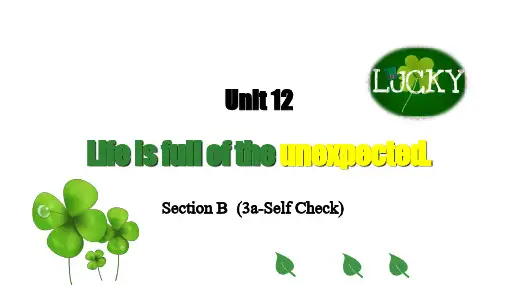
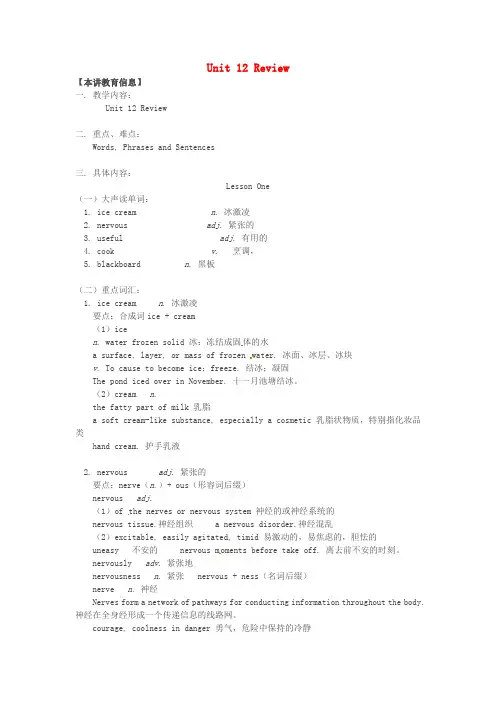
Unit 12 Review【本讲教育信息】一. 教学内容:Unit 12 Review二. 重点、难点:Words, Phrases and Sentences三. 具体内容:Lesson One(一)大声读单词:1. ice cream n.冰激凌2. nervous adj.紧张的3. useful adj.有用的4. cook v.烹调,5. blackboard n.黑板(二)重点词汇:1. ice cream n.冰激凌要点:合成词ice + cream(1)icen. water frozen solid 冰:冻结成固体的水a surface, layer, or mass of frozen water. 冰面、冰层、冰块v. To cause to become ice;freeze. 结冰;凝固The pond iced over in November. 十一月池塘结冰。
(2)cream n.the fatty part of milk 乳脂a soft cream-like substance, especially a cosmetic 乳脂状物质,特别指化妆品类hand cream. 护手乳液2. nervous adj.紧张的要点:nerve(n.)+ ous(形容词后缀)nervous adj.(1)of the nerves or nervous system 神经的或神经系统的nervous tissue.神经组织 a nervous disorder.神经混乱(2)excitable, easily agitated, timid 易激动的,易焦虑的,胆怯的uneasy 不安的 nervous m oments before take off. 离去前不安的时刻。
nervously adv.紧张地nervousness n.紧张 nervous + ness(名词后缀)nerve n.神经Nerves form a network of pathways for conducting information throughout the body. 神经在全身经形成一个传递信息的线路网。
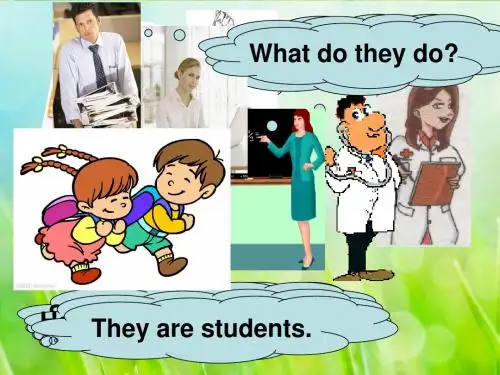
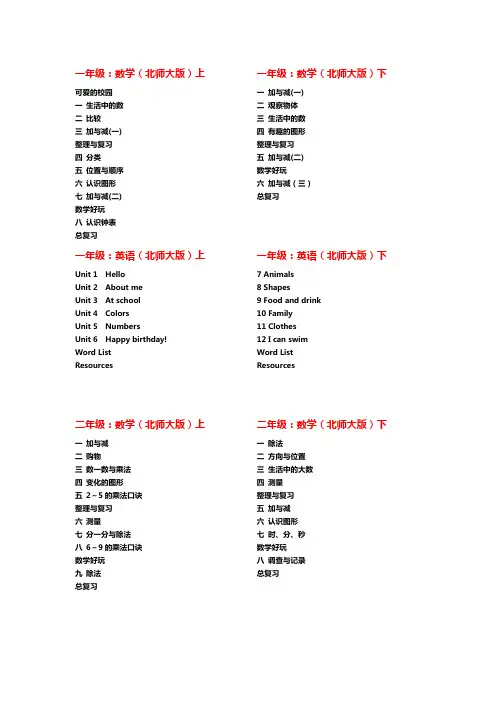
可爱的校园一生活中的数二比较三加与减(一)整理与复习四分类五位置与顺序六认识图形七加与减(二)数学好玩八认识钟表总复习一年级:英语(北师大版)上Unit 1 HelloUnit 2 About meUnit 3 At schoolUnit 4 ColorsUnit 5 NumbersUnit 6 Happy birthday!Word ListResources二年级:数学(北师大版)上一加与减二购物三数一数与乘法四变化的图形五2~5的乘法口诀整理与复习六测量七分一分与除法八6~9的乘法口诀数学好玩九除法总复习一加与减(一)二观察物体三生活中的数四有趣的图形整理与复习五加与减(二)数学好玩六加与减(三)总复习一年级:英语(北师大版)下7 Animals8 Shapes9 Food and drink10 Family11 Clothes12 I can swimWord ListResources二年级:数学(北师大版)下一除法二方向与位置三生活中的大数四测量整理与复习五加与减六认识图形七时、分、秒数学好玩八调查与记录总复习Unit 1 Hello!Unit 2 Mocky’s friendsUnit 3 My friendsUnit 4 My familyUnit 5 WelcomeUnit 6 ReviewUncle Booky’s ABC VocabularyWord ListMasks三年级:数学(北师大版)上一混合运算二观察物体三加与减四乘与除整理与复习五周长六乘法七年、月、日数学好玩八认识小数总复习三年级:英语(北师大版)上Unit 1 Don’t walk!Unit 2 How much?Unit 3 Uncle Booky’s studyUnit 4 Bobby’s houseUnit 5 Our schoolUnit 6 ReviewUncle Booky’s ABC VocabularyWord ListAppendix Unit 7 FruitUnit 8 VegetablesUnit 9 NumbersUnit 10 ColorsUnit 11 I canUnit 12 ReviewUncle Booky’s ABC VocabularyWord List三年级:数学(北师大版)下一除法二图形的运动三乘法整理与复习四千克、克、吨五面积数学好玩六认识分数七数据的整理和表示总复习三年级:英语(北师大版)下Unit 7 At the restaurantUnit 8 Big birdUnit 9 Hot soupUnit 10 Mockey’s storeUnit 11 I’m not wellUnit 12 ReviewUncle Booky’s ABC VocabularyWord List四年级:数学(北师大版)上一认识更大的数二线与角三乘法整理与复习四运算律五方向与位置六除法七生活中的负数数学好玩八可能性总复习四年级:英语(北师大版)上Unit 1 Mocky the jugglerUnit 2 I like BobbyUnit 3 It’s too expensive!Unit 4 Where is it?Unit 5 Our townUnit 6 ReviewVocabularyWord ListPositions Master五年级:数学(北师大版)上一小数除法二轴对称和平移三倍数与因数整理与复习四多边形的面积五分数的意义六组合图形的面积数学好玩七可能性总复习四年级:数学(北师大版)下一小数的意义和加减法二认识三角形和四边形三小数乘法整理与复习四观察物体五认识方程数学好玩六数据的表示和分析总复习四年级:英语(北师大版)下Unit 7 Today is MondayUnit 8 Mocky is lateUnit 9 Day and nightUnit 10 Let’s go!Unit 11 Uncle Jack’s farmUnit 12 ReviewVocabularyWord List“Going to" Master五年级:数学(北师大版)下一分数加减法二长方体(一)三分数乘法四长方体(二)整理与复习五分数除法六确定位置七用方程解决问题数学好玩八数据的表示和分析总复习五年级:英语(北师大版)上Unit 1 Ann’s dreamUnit 2 Mocky’s bad dayUnit 3 School sports dayUnit 4 Mocky’s birthdayUnit 5 I’m tallerUnit 6 ReviewVocabularyVerb FormsSpecial Sounds六年级:数学(北师大版)上一圆二分数混合运算三观察物体四百分数整理与复习五数据处理六比的认识数学好玩七百分数的应用总复习六年级:英语(北师大版)上Unit 1 Meeting the BINGO Kids Unit 2 Charlie’s choresUnit 3 Redrock Bay Health Club Unit 4 Choosing a giftUnit 5 The broken computer Unit 6 ReviewVocabularyWord List 五年级:英语(北师大版)下Unit 7 At the airportUnit 8 The concertUnit 9 A football gameUnit 10 Buying e-booksUnit 11 Cooking with Mocky Unit 12 ReviewWord ListSpecial Sounds六年级:数学(北师大版)下一圆柱与圆锥二比例三图形的运动四正比例与反比例数学好玩整理与复习总复习六年级:英语(北师大版)下Unit 7 The mountion bike race Unit 8 In the emergency room Unit 9 Life in the year 2050Unit 10 Review 1Unit 11 Review 2Unit 12 Review 3Test 1Test 2Vocabulary。
北师大二年级Unit 12 Review教学背景分析1、教学内容分析本节课是北师大版小学英语二年级下册第十二单元Review第三课时。
本单元的主要内容:1、复习前面单元关于颜色,数字以及询问名称的功能句;2、引导学生开展买菜,买水果的活动,尝试运用所学的语言进行会话。
本节课分为Talk together, Listen and number以及write the letter三个部分。
其中write the letter 是归纳了本书sounds and letters版块的所有内容。
针对我的研究专题“小学低年级英语课堂评价的有效性运用”,通过学生自评,生生互评,小组内评,口头评价,家长评等方式进行教学。
课堂评价的主要目的在于激励学生学习,帮助学生有效调控自己的学习过程,使学生获得成就感,增强自信心,培养合作精神。
通过有效评价,使学生在课堂上运用所学语言进行交流,进一步理解运用有关购物用语。
2、学生情况分析本班学生共有39人。
低年级学生多数在课堂上还是敢于表现自己,积极参与课堂活动的。
在平时的英语教学中,我发现每个孩子都有渴望成功的愿望,由于性格与接受能力等不同因素致使有的学生把这种愿望深深的埋在心里,希望通过有效的课堂评价,尝试在教学活动中调动每个孩子的学习积极性。
由于在本单元的故事部分已经复习了本学期的主要内容。
在本节课的教学中,呈现的是选购水果的情景对话,它复现了前面单元的内容,例如颜色、数字、以及询问名称的功能。
利用Talk together的学习进一步要求学生能够运用基本句式在购物情景中进行交流。
∙教学目标:∙能理解对话的内容;∙能听懂,会说明物品的数量;∙能用句型How many do you want? Are these oranges? No, they are lemons. 等在购物情境中进行交流;∙利用游戏,评价等方式激发学生的学习兴趣,运用多媒体课件培养他们的观察力和注意力; 在多种活动的辅助下为学生提供机会,培养学生运用语言的能力,促进学生善于听说、乐于听说等良好学习习惯的形成。
课题Unit 12 There is a famous lake .课时数4教材解读本单元主要学习有关著名景点的词汇,如famous lake, famous mountain , famous park, famous square, famous temple等,要求学生在听、说、认、读之后能达到正确书写的程度。
对于本课中出现的句型,如There is also a famous temple. / You must go and see the Tiantan Temple. / Yes. / sure. / OK. / Great!等,要求学生能熟练运用,并能由此拓展,进行交流。
通过对职业的介绍,培养学生的观察能力和英语表达能力.教学目标A类:1、掌握五会(听、说、读、写、译)单词dish、tour brochure、tour guide、try2、掌握四会(听、说、读、译)单词famous dish、famous lake、famous park、famousmountain、famous temple、famous square、famous place、fried beancurd2、能够运用所学音标判断字母在不同单词中的不同发音。
B类:1、熟练运用句型There is a famous mountain. You can visit the Tianzi Mountain.You must go to the Dongting lake.等2、Lesson34 Look, listen and read 部分课文的熟练朗读及其意的理解。
3、Lesson 35 Listen and read部分的认读及其意的理解。
C类:1、通过学习各地的著名景点,培养学生热爱环境、保护环境的思想品质。
2、通过多种形式的活动,激发学生学习英语的兴趣。
第一课时个体学习清单教学目标1、能够认读、英汉互译dish、famous dish、famous lake、famous park、famous mountain、famoustemple、famous square、famous place、fried beancurd2、掌握句型There is a famous mountain. You can visit the Tianzi Mountain. You must go to theDongting lake. 让学生能够掌握这些词在动词和名词之间转换。
Unit12 Review 3
Teaching aims:
1.To enable the ss to understand the knowlegae of Unit9-Unit11.
2.To help the ss write out their holiday plans.
3.To develop the ss’ abilities of speaking ,writing and listening. Teaching key points:
1.To review the past event and future event.
2.To consolidate their writing.
Teaching methods:Practice and Activity .
Teaching aids:PPT and Tape
Teaching procedure:
Step 1:Have a dictation
Lose-lost find-found carry-carried
Push-pushed pull-pulled give-gave
Step 2:Presentation:
Activities:
(1)Listen and write.
1.Listen to the tape for the exercises.
2.Listen to the tape again and write down the missing words.
3.Check the answers.
(2)Listen ,look and write.
1.Look at the pictures and talk about them.
2.Try to write out the missing words.
3.Listen to the tape for the question and write down the answers.
4.Ask someone to say out their the answers.
5.Read the answers together.
(3)Read and write.
1.Read the question.
2.Read the passage by themselves.
3.Write down the answers and ask one students to write his answer on the blackboard.
4.Talk out the answers.
(4)Listen read and circle.
Listen to the tape and circle the words.
Task:plan a trip
1.Free talk about their trip between T and Ss.
2.Free talk between Ss and Ss.
3.Read the example record table..
4.Fill your record talbe and write a passage about your trip.
5.Ask some students to read their passages.
Step3:Homework.
Finish the exercise of Unit12.。